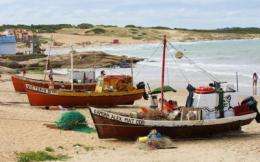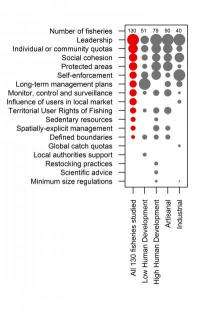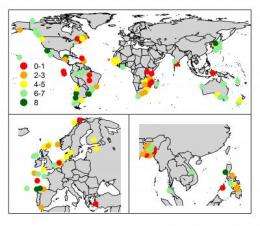Co-management holds promise of sustainable fisheries worldwide

Encouraging new evidence suggests that the bulk of the world's fisheries – including small-scale, often non-industrialized fisheries on which millions of people depend for food – could be sustained using community-based co-management.
"The majority of the world's fisheries are not – and never will be – managed by strong centralized governments with top-down rules and the means to enforce them," according to Nicolas Gutiérrez, a University of Washington doctoral student in aquatic and fishery sciences who is lead author of a paper that goes online Jan. 5 in the journal Nature. "Our findings show that many community-based co-managed fisheries around the world are well managed under limited central government structure, provided communities of fishers are proactively engaged.
"Community-based co-management is the only realistic solution for the majority of the world's fisheries and is an effective way to sustain aquatic resources and the livelihoods of communities depending on them."
Under such a management system, responsibility for resources is shared between the government and users. On the smallest scale, this might involve mayors and fishers from different villages agreeing to avoid fishing in each other's waters. Examples on a larger scale include Chile's most valuable fishery – the snail called "loco," also known as Chilean abalone – that started in 1988 with local fishers in a single community cooperating along a 2-mile (4-km) stretch of the coastline and today involves 700 co-managed areas with 20,000 artisanal fishers along 2,500 miles (4,000 km) of coastline.
While case studies of individual co-managed fisheries exist, this new work used data on 130 fisheries in 44 developed and developing nations and included such things as marine and freshwater ecosystems as well as diverse fishing gears and targeted species.

Statistical analysis shows co-management typically fails without such keys things as:
- Prominent community leadership and social cohesion
- Clear incentives that, for example, give fishers security over the amount they can catch or the area in which they can fish
- Protected areas, especially when combined with regulated harvest inside or outside the area, and when the protected area is proposed and monitored by local communities
The new study further confirms the theories of Elinor Ostrom, who won a Nobel Prize in economics in 2009 for challenging the conventional wisdom that common property is always poorly managed and should be either regulated by central authorities or privatized. Resource users frequently develop sophisticated mechanisms for decision-making and rule enforcement, she said, to handle conflicts of interest.
"Elinor Ostrom was right," says Omar Defeo, University of Uruguay professor, scientific coordinator of Uruguay's national fishery management program and co-author on the paper. "With community-based co-management, fishers are capable of self organizing, maintaining their resources and achieving sustainable fisheries."
After reading the paper in advance of publication, Ostrom called the work "fabulous" and said, "It was very exciting to see the findings about community cohesion founded on norms, trust, communication, commitment and respect for leaders being the most important attributes leading to successful fisheries co-management."

For the Nature paper, Gutiérrez assembled data from scientific literature, government and non-government reports and personal interviews for 130 co-managed fisheries looking to score them on eight outcomes – ranging from community empowerment to sustainable catches to increases in abundance of fish and prices of what was caught.
With 40 percent of the fisheries scoring positively on 6, 7 or all 8 outcomes, and another 25 percent scoring positively on 4 or 5 of the outcomes, the co-authors write that community-based co-management "holds great promise for successful and sustainable fisheries worldwide."
Ray Hilborn, UW professor of aquatic and fishery sciences and a co-author on the Nature paper, was also co-author of a paper in Science in 2009 that found that many of the major industrial fisheries and fishery ecosystems were becoming more sustainable.
"This new paper further illustrates the world's growing ability to manage fisheries sustainably and that the tools appropriate for industrial fisheries in countries with strong central governments are quite different from those in small-scale fisheries or countries without strong central governments," he says.
The work was supported by the National Science Foundation, the Fulbright-Organization of American States Ecology Program and Pew Charitable Trusts.
Provided by University of Washington














